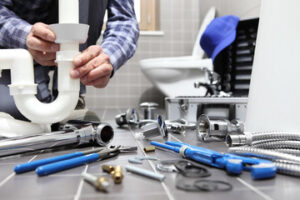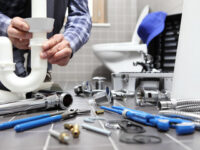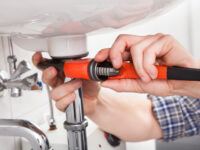What Does a Residential Plumber Do?
Residential plumbers deal with plumbing issues that occur in people’s homes. They perform pipe system installations and repair plumbing fixtures and toilets. Plumbers Aurora CO also snagged clogged drain lines in single-family houses and apartment buildings.
 On the other hand, commercial plumbing involves expansive systems serving multiple occupants. Plumbers specializing in commercial plumbing services must have higher insurance coverage and adhere to stricter licensing requirements.
On the other hand, commercial plumbing involves expansive systems serving multiple occupants. Plumbers specializing in commercial plumbing services must have higher insurance coverage and adhere to stricter licensing requirements.
As the name suggests, residential plumbers specialize in plumbing tasks that occur inside homes. This includes installing new pipe systems, fixtures and water appliances, as well as making repairs to existing ones. A residential plumber is also qualified to inspect a home’s plumbing and sewage system to make sure it meets all local safety and health codes.
Many homeowners choose to hire a plumber to install a whole-home water filtration system. This is a great way to ensure that all of the water entering your home is clean and safe for drinking, cooking and bathing. This type of plumbing service can be especially beneficial for those living in areas where the tap water contains a high level of minerals or other impurities, which can cause damage to pipes and appliances over time.
Residential plumbers can also help with a variety of other plumbing-related issues in the home. This can include repairing or replacing toilets, fixing leaky faucets and showerheads, and unclogging drains. They can even install water heaters, which is a good idea for those who want to save money on their energy bills.
Plumbers can also make recommendations on the best water filtration systems for your home. A quality water filtration system can remove a wide range of contaminants from your home’s water, including harmful chemicals and heavy metals. It can also reduce the amount of limescale buildup that can damage your plumbing fixtures and appliances over time.
Unlike residential plumbers, commercial plumbers typically work on larger plumbing systems. They may be responsible for repairing and maintaining all of the plumbing in a large office building, hotel or school. The types of plumbing systems they deal with may be more complex than those in individual homes, and they may have to follow different codes and regulations.
Commercial plumbers are also likely to spend more time on each job than their residential counterparts. This is because it can be more difficult to diagnose and fix problems in a larger space. For example, it can take longer to find a hidden leak in the ceiling of a 20-story building than it would in a two-story house. Additionally, it can be more challenging to clear clogged drains when there are multiple sinks and toilets in the same area.
Repair
Residential plumbers repair plumbing systems in homes. This can include fixing leaks, replacing toilet parts, and addressing issues with bathtubs, sinks, and showers. They may also install appliances like water heaters and dishwashers. Residential plumbers also service sewer lines and waste removal systems. This includes repairing clogged pipes, removing debris from the line, and inspecting and testing the system to ensure it is functioning properly.
Plumbing issues can arise in any home, at any time. Whether it is a pesky clogged drain or an entire broken plumbing system, you want to find a reputable plumber in St Louis as soon as possible. Not only will a professional get the job done right, but they will save you money in the long run by fixing the problem before it gets worse.
One of the most common services offered by plumbers is clogged drain cleaning. This is especially true during the winter when the pipes can freeze and clog. Residential plumbers use a variety of methods to clear out drains including sewer snakes, augers, chemical cleaners, and hydro jetting. Many of these tools are available at hardware stores.
When you are looking for a plumber to service your home, it is important to do your research. Check out online reviews and ask friends and family for recommendations. You should also make sure the plumber is licensed and insured. In addition to being licensed, a plumber should have current certifications and a good standing with the Better Business Bureau.
Whether it is an appliance installation or a plumbing emergency, you need a reliable and knowledgeable plumber on your side. Residential plumbers are skilled in troubleshooting and completing a wide range of plumbing tasks, making them the ideal choice for any home or apartment.
While there are similarities between commercial and residential plumbing, there are a few key differences. The main difference is that commercial plumbing involves much larger buildings and more complex plumbing systems. For example, a skyscraper may have hundreds of toilets and a complicated water heating system. Additionally, commercial plumbing often requires more in-depth knowledge of regulatory requirements and public health codes.
Maintenance
Residential plumbers repair and maintain plumbing systems in houses, apartment complexes, and condominiums. They can handle a variety of tasks including repairing leaks, installing fixtures, and ensuring that water heaters are functioning properly. They also perform routine maintenance such as scrubbing drains, testing for water pressure, and cleaning out sewer lines. They are skilled at joining pipes with various methods including soldering, compression fittings, threaded connections, solvent weld, and push-fit fittings.
Residential plumbing companies offer emergency services as well, which is a huge benefit for homeowners who often put off plumbing issues until they are in the middle of an uncomfortable situation such as a clogged shower or water that won’t turn on. A trustworthy residential plumber will be able to come out immediately and solve the problem to prevent further damage and expensive repairs.
Commercial plumbers work in a wide range of settings including offices, schools, hospitals, and industrial plants. They install, maintain, and repair large plumbing systems that serve many people at once. Their responsibilities may include working with building owners, managers, and architects to plan out the system before construction begins. Once the building is open, they will inspect the plumbing to ensure it is working properly.
Leaks, clogs, and other problems are more common in commercial spaces because of the high volume of people using the same systems. This can make it more challenging to pinpoint the issue and find a solution. Plumbing equipment is also larger in commercial spaces, so it is more likely to break down.
Both residential and commercial plumbers must be familiar with local building codes and regulations to ensure that their work meets standards. They also must be comfortable working in tight spaces and on ladders to access pipes in hard-to-reach areas. They may also need to use special tools like augers and snakes to unclog drains and pipes.
There are a few key differences between residential and commercial plumbing, but both professions require extensive training and experience. In general, residential plumbers spend more time interacting with customers and tend to have less complicated jobs than their commercial counterparts. The type of plumbing you choose to focus on will ultimately determine your salary and job outlook.
Troubleshooting
Residents often call plumbers when they encounter issues with their home plumbing. These issues may include clogged drains, low water pressure, or even a pipe burst. While there are many DIY solutions to these problems, it is always best to hire a professional to get the job done right. This will ensure that the problem is fixed in a timely manner and correctly. In addition, hiring a residential plumber can help homeowners avoid costly repairs in the future.
Residential plumbers have a wide range of services that they can offer. They can inspect a house’s plumbing system to identify any potential issues, and they can also provide advice on how to prevent these issues from occurring in the future. In addition, they can repair and install various appliances and fixtures in a home. This includes garbage disposals, toilets, shower and sink drains, and even sewage systems.
Unlike residential plumbers, commercial plumbing technicians deal with much more complex systems. Their work can include repairing and installing water heaters, backflow prevention devices, and more. Commercial plumbers must have excellent troubleshooting skills to be able to diagnose and resolve issues in a fast and efficient manner. They also need to have the stamina to perform physically demanding tasks for long periods of time.
In addition, commercial plumbers must be knowledgeable about a wide range of building codes and regulations. For example, they must understand how different materials impact the plumbing system’s ability to function. They must also be able to recognize and address any code violations. Commercial plumbers can be found working in a wide range of industries, including retail, food service, hospitals, and office buildings.
If you’re experiencing plumbing issues at your Indianapolis home, it’s important to know what type of plumber to call. By understanding the differences between residential and commercial plumbers, you can be sure to find the right one to fix your problem. And remember, before attempting any DIY fixes, be sure to turn off your water and gas at the main valves. This will prevent any further damage to your pipes and appliances.




